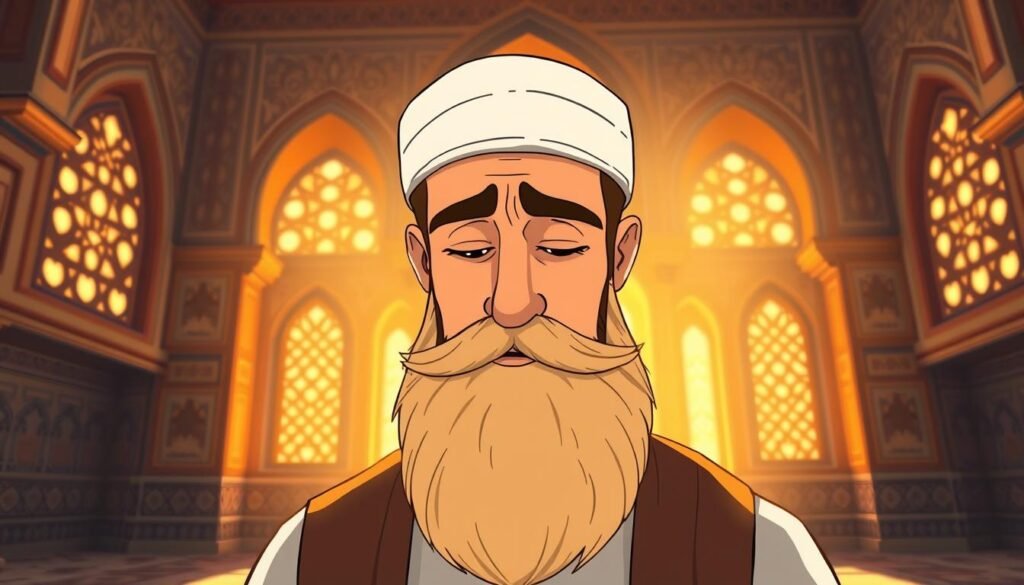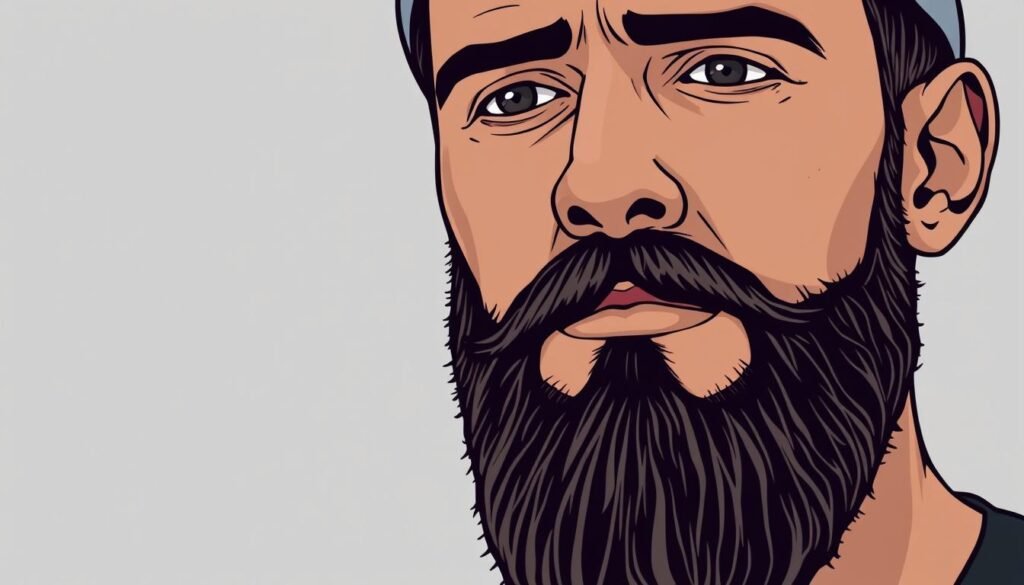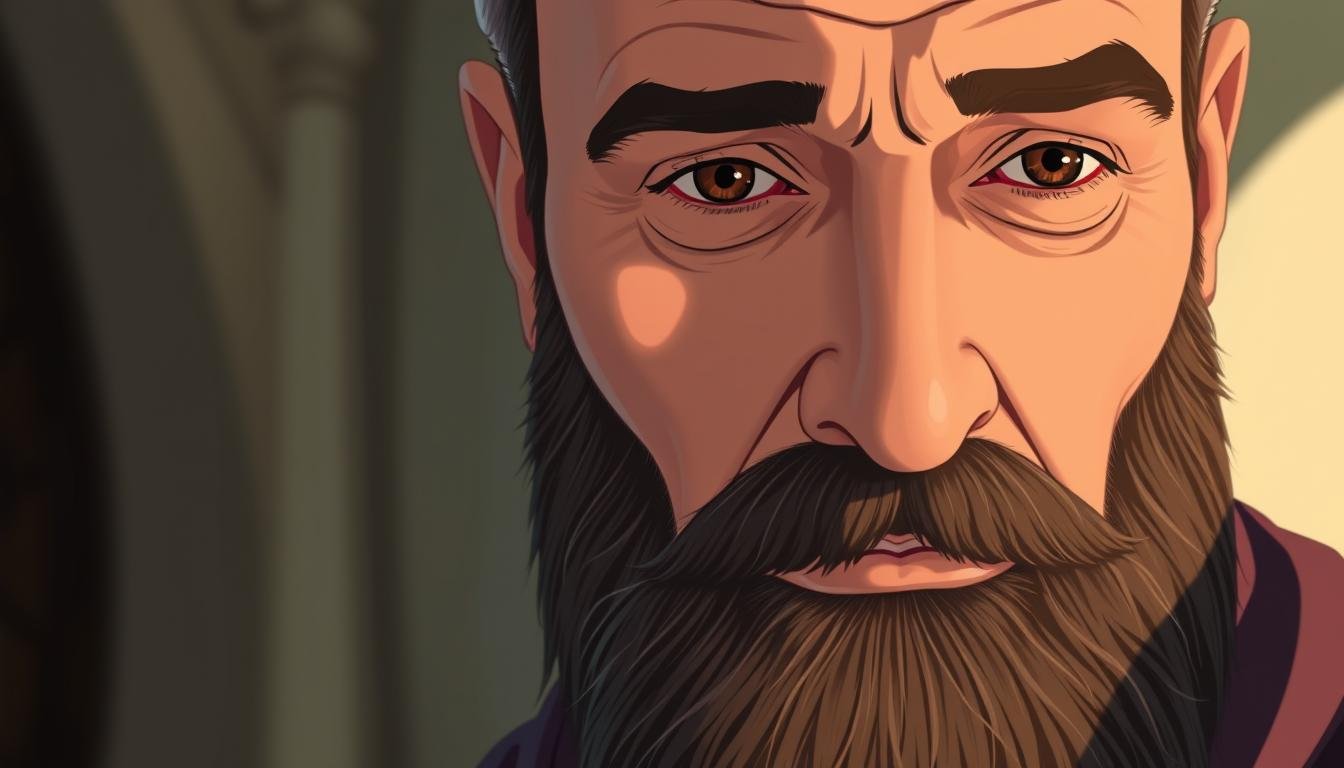Thinking about my journey with the Islamic beard makes me see its deep meaning. The beard shows a man’s masculinity and Muslim identity. We’ll look into the history of beards in Islam and the Prophet Muhammad’s teachings.
We’ll also see how beards shape a man’s identity in Islamic societies. The beard is a key part of a man’s look and faith.
The Prophet Muhammad ﷺ told men to “let your beards grow and trim your moustaches.” This is in Bukhari (Sahih n°5892) and Muslim (Sahih n°259). It shows how important the beard is in Islam.
This practice ties to Islamic teachings on modesty. The beard is a sign of faith and identity. As we explore the Islamic beard, we’ll look at its cultural and religious importance.
The idea of fitra in Islam includes trimming the moustache and growing the beard. It’s a key part of our faith. Understanding the Islamic beard’s significance is vital in today’s world.
The Islamic Significance of Facial Hair
Exploring Islamic culture, I find facial hair, like the beard, very interesting. The beard in Islamic culture is a sign of masculinity. It shows a Muslim man’s identity.
The Prophet Muhammad (peace be upon him) taught its importance. He said a beard shows faith and identity.
In old Arabia, beards meant power and manhood. The Prophet Muhammad (peace be upon him) made it clear. He said a beard is part of a man’s look and faith commitment.
Across Islamic worlds, the Islamic beard shapes a man’s identity. It stands for wisdom, knowledge, and spirituality.
The beard as a symbol of masculinity is key in Islam. It helps a person stand out and show faith, humility, and wisdom. This topic shows the depth and richness of Islamic culture and the beard’s role.
Understanding the Hadith About Beard in Islamic Tradition
The Hadith about beard in Islamic tradition shows the beard’s importance. It’s seen as a sign of masculinity and a Muslim symbol. The beard is considered natural for men, as it’s part of Fitrah.
The Arabic word for beard is ‘lihya.’ It includes hair from the jawline to the throat. The Prophet Muhammad (peace be upon him) told Muslims to “Cut the mustache short and let the beard grow.” This shows the beard’s role in Islam.
Looking into the beard in Islam, we see it’s for hygiene. Food can get stuck if not cleaned. The Prophet (peace be upon him) also said to dye gray hair and beards. This helps Muslims stand out from Jews and Christians.
The Prophet Muhammad’s Teaching on Beards
Let’s explore why beards are important in Islam. We must look at what Prophet Muhammad (peace be upon him) taught about them. He taught that beards are natural and show masculinity and Muslim identity.
The Prophet said beards show wisdom, knowledge, and spirituality. Scholars mostly agree that shaving your beard is not good. This shows how important beards are in Islam.

Looking into what the Prophet said about facial hair, we see it’s more than looks. It’s about being modest, humble, and devoted to God. Following the Prophet’s teachings on beards helps Muslims understand their faith better.
Different Schools of Thought on Beard Maintenance
Exploring Islamic beard maintenance, I see many views. The Shafi’i school says shaving is not good but not forbidden. Scholars like Ibn Hajar al-Haytami and Imam Nawawi stress the beard’s role in showing Muslim identity.
The Hanafis and Hanbalis, though, think a beard is a must. This shows how complex beard rules are in Islam. It’s key for people to learn about these views.
Islamic teachings suggest keeping the beard long, as Ibn Hajar said. Yet, some say trimming is okay, as long as it doesn’t draw too much attention. This shows the focus on being sincere and humble in beard care.
Choosing to have a beard is up to each person. It’s about finding a balance between faith and everyday life. By following the Prophet Muhammad’s example, people can feel proud of their faith. This helps us understand Islam better today.
Proper Beard Care According to Sunnah
Exploring Islamic beard care shows us the importance of following Sunnah. The Prophet Muhammad (peace be upon him) taught us to keep our beards clean and neat. This is part of shar’i beauty, which is Islamic beauty, not just Western fashion.
is key. The Prophet (peace be upon him) said, “Whoever has hair, let him take care of it.” This advice is for both head and beard hair. Many bearded men see hygiene as the top beard care priority. Also, many believe that regular grooming makes them look more professional.
Length Requirements and Grooming Practices
In Islam, there’s no strict beard length rule. But, it’s good to keep it moderate. The Prophet Muhammad (peace be upon him) said we must let our beards grow. This is a religious rule, not just a choice.
For grooming, 50% of men with beards use beard oil often. And, 90% of beard balm users say it makes their beard easier to manage.
Recommended Products and Tools
Choosing the right beard care products and tools is important. We should pick natural and halal ones. This is because 30% of men look for vitamins and supplements to help their beard grow.
By following Sunnah’s beard care rules, we keep our beards healthy and neat. This shows our commitment to Islamic values. As we learn more about beard in Islam, we see that caring for our beards is more than just hygiene. It’s about our faith and identity.
Common Misconceptions About Islamic Beard Requirements
Exploring Islamic beard rules, we find many myths. Some think beards are not key in Islam. But, beards are a big deal, showing a man’s masculinity and faith.
Islamic teachings say it’s waajib (obligatory) to have a beard at least one fist long. Cutting it shorter is not allowed. This shows how important beards are in Islam.

To clear up these myths, we need to talk more about beards in Islam. This way, we can create a welcoming space for Muslims to show their faith through their beards. Beards are a big part of Islamic culture and should be respected.
Beard rules are a big part of being a Muslim. By understanding and respecting these rules, we can build a better community. A community where everyone values the beard’s role in Islam.
Balancing Religious Obligation with Modern Life
Thinking about an Islamic beard makes me think about the hard parts of mixing faith with today’s world. Keeping a beard can be tough, mainly in jobs where how you look matters. It shows how hard it is to keep up with faith in our busy lives.
When it comes to an Islamic beard, there are many views in the Muslim world. Some say it’s a must for men, while others see it as a good practice. This shows how important it is to learn about beards in Islam. We need to understand and accept beards as part of faith.
Trying to mix faith with today’s world is key. We must value our community and respect each other. This way, we can make a place where everyone can show their faith, like wearing a beard, without worry.
Health Benefits Associated with Keeping a Beard
Exploring the world of beards, I find many health benefits. These benefits are interesting in both the Islamic community and science. Studies show beards protect against the sun’s UV rays, lowering skin cancer risk.
Beards also trap pollutants and dust, keeping them out of the mouth and nose. This is great for those with allergies or asthma. It helps reduce symptoms and improves health.
The beard in Islam is more than a symbol. It’s a natural health protector. The Prophet Muhammad (peace be upon him) encouraged long beards.
Keeping a beard can also lower skin irritation and infection risks. It boosts overall health and wellbeing. Reflecting on these benefits, I see the value in embracing our natural beauty and caring for our bodies.
Cultural Impact of Muslim Beards in Contemporary America
Thinking about Muslim beards in America today makes me think of the hard work many Muslim men put into growing their beards. People often say “Great beard” to them, showing more people like beards now. But, not everyone is okay with beards, and some Muslim men face unfair treatment because of theirs.
There’s a big market for beard care products like oils and shampoos. This shows beards are getting more popular, not just among Muslims. Even non-Muslims join in the “Grow Your Beard” month, showing we all like to take care of our beards. The story of Muslim beards in America is full of ups and downs, and we need to hear from all Muslim men about their experiences.
Beards hold a special place in Islam, showing a Muslim’s identity. Growing a beard is more than a choice; it’s a way to feel connected to others and show faith. As we deal with the ups and downs of having a beard in a different culture, we must think about how Muslim beards can help us understand and respect each other more.
Embracing Your Beard as Part of Your Islamic Identity
As Muslim men, embracing your beard is a deep way to honor your Islamic identity. The beard is more than looks; it shows your devotion to the Prophet Muhammad (peace be upon him). A well-groomed beard shows wisdom, knowledge, and spirituality, just like the Prophet valued.
The beard’s role in Islam is debated, but most agree it’s a religious duty. Keeping a beard shows your faith and wish to follow the Prophet. Millions of Muslims worldwide share this practice, making you part of a strong community.
FAQ
What is the significance of beards in Islamic culture?
What does the Hadith say about the importance of keeping a beard?
How do different schools of thought approach beard maintenance?
What are the proper beard care practices according to Sunnah?
What are common misconceptions about Islamic beard requirements?
How can Muslim men balance religious obligation with modern life when it comes to keeping a beard?
What are the health benefits associated with keeping a beard?
What is the cultural impact of Muslim beards in contemporary America?
Why is it important to embrace your beard as part of your Islamic identity?

Embracing Faith, One Insight at a Time!
The teachings of the Quran have always guided my path. With a deep passion for Islamic knowledge, I strive to blend the wisdom of tradition with the relevance of today, making the timeless messages of Islam accessible and meaningful for everyone.
Muslim Culture Hub is my platform to share historical insights and thought-provoking articles, exploring both well-known and lesser-discussed aspects of Islamic culture and beliefs. My mission is to create an inclusive online space where everyone can learn, strengthen their faith, and connect with the profound message of Islam.
Join the journey!
May peace be upon you.








